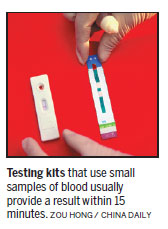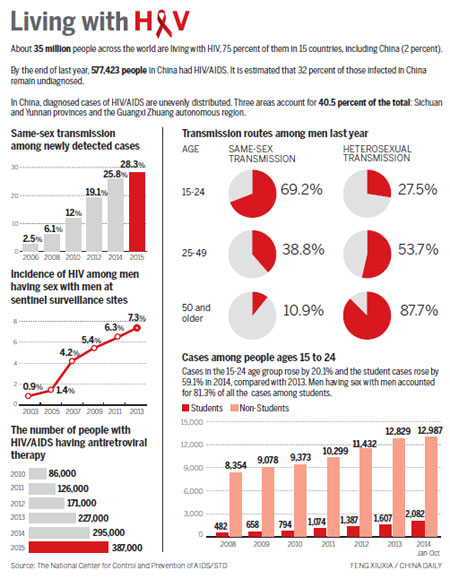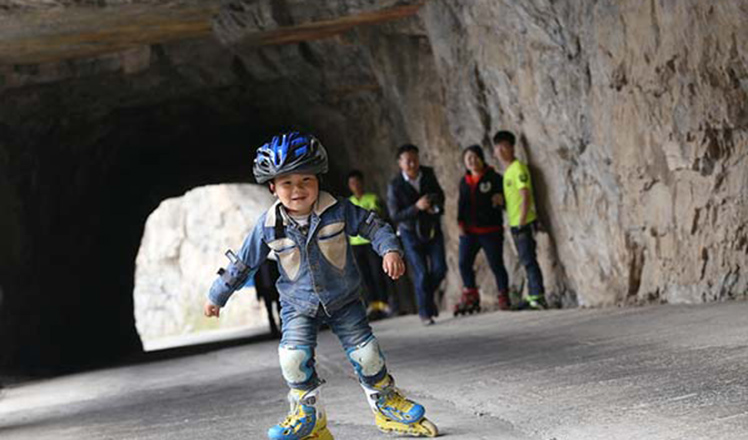New hiv testing project targets groups most at risk
Updated: 2016-04-21 08:06
By Shan Juan(China Daily)
|
||||||||

Improved outcomes
Wu Zunyou, the AIDS specialist, said there is an urgent need to detect people with the disease and provide treatment: "Early treatment improves outcomes and helps curb further HIV transmission because the viral load of the infected person is lower."
To that end, the health authorities have initiated a one-stop service, designed to facilitate quick access to lifesaving antiretroviral treatment for newly diagnosed sufferers. The process takes about two weeks from initial screening to the patient receiving medication, while it usually takes an average of two to three months, he said.
Studies in a number of pilot regions show that the project has succeeded in reducing the mortality rate from AIDS by 40 percent, thanks to more-timely treatment. "The model will be expanded nationwide within the year," Wu said.
On a visit to China earlier this month, Peter Reis, senior vice-president of the AIDS Healthcare Foundation in the United States, said he was impressed by the promising results, but the process could be accelerated by the adoption of a new approach to testing.
At present, the thousands of HIV-testing outlets in China perform rapid tests on blood samples or saliva collected via oral swabs, which can produce a result in less than 20 minutes.
However, a lab confirmation test is required before a patient is placed on a course of treatment. That can take more than a month in Beijing and even longer in remote rural areas.
"The waiting hurts mentally, and many people simply disappear from the doctors' attention during that period, mostly out of fear and uncertainty," said Xiao Dong, head of Tongzhi, an NGO committed to combating AIDS.
Reis, who spoke with Xiao during his trip, referred to an innovative approach widely practiced in the US and many other countries under which people can be put on treatment immediately if they take three rapid HIV tests and the results are all positive.
To ensure accuracy, the method employs three separate tests that are undertaken with kits made by three different manufacturers, according to Reis, whose foundation has worked closely with the Chinese health authorities for years to introduce and popularize the approach.
Wu Hao, of the YouAn hospital, a trial site partly sponsored by the foundation, said the organization has provided substantial help with the nation's new treatment strategy by providing treatment for all HIV-positive patients, regardless of their CD4 count, which indicates a person's level of immunity. A normal CD4 count ranges from 500 to 1,200 cells per square millimeter.
Previously, antiviral therapy was not administered until a patient had tested positive and had a low CD4 count, he said.
"We practiced the 'triple-rapid-test-to-treatment' model in several hundred cases and only one produced a false positive," Wu Hao said. Treatment can be given within three days as long as the patient is mentally well-prepared.
The drugs don't have serious side effects.
"In general, this method of testing method is highly accurate," he said.
Accuracy is key
Jiang Yan, head of the AIDS reference laboratory at the National Center for AIDS and Sexually Transmitted Disease Control and Prevention, said the speed and benefits of the triple-rapid-test treatment are widely recognized. "But accuracy has to be ensured as well," she said.
She said accuracy is also required from the person performing the test: "The medics at the YouAn Hospital are so well-trained that the level of accuracy is high."
She said the approach could be trialed with high-quality kits and well-trained testing staff in regions where the incidence of HIV is high and in high-risk groups, such as sexually active gay men.
The approach has been included in China's recently revised HIV testing guidelines, which will be distributed to AIDS-control agencies across the country, which is a positive move, she said.
Contact the writer at shanjuan@chinadaily.com.cn

- Readers at a 24-hour bookstore in Beijing
- As country's population has grown, so has the level of higher education
- Charities rebuild image through relief efforts
- New hiv testing project targets groups most at risk
- Study finds 20-year slump in exercise
- Little champ: Four-year-old roller skates on cliff
- Canadian PM Trudeau slips from political ring to boxing ring
- Japanese lawmakers visit war-linked Yasukuni Shrine en masse
- Palestinian residents of Gaza Strip face growing water shortage
- Delayed Yemen peace talks begin in Kuwait
- Cuba, US agree to deepen cultural cooperation
- Ecuador continues recovery efforts following powerful quake

 In pics: Top 10 richest cities in China
In pics: Top 10 richest cities in China
 Readers at a 24-hour bookstore in Beijing
Readers at a 24-hour bookstore in Beijing
 Flame for Rio Olympics lit in ancient Greek ruins
Flame for Rio Olympics lit in ancient Greek ruins
 Britain's Queen Elizabeth II celebrates 90th birthday
Britain's Queen Elizabeth II celebrates 90th birthday
 Former NBA star Stephon Marbury's life in Beijing
Former NBA star Stephon Marbury's life in Beijing A 75-year-old kite runner in west China's Shannxi
A 75-year-old kite runner in west China's Shannxi
 $2 million hyper car crash in east China's Zhejiang province
$2 million hyper car crash in east China's Zhejiang province
 Little champ: Four-year-old roller skates on cliff
Little champ: Four-year-old roller skates on cliff
Most Viewed
Editor's Picks

|

|

|

|

|

|
Today's Top News
Liang avoids jail in shooting death
China's finance minister addresses ratings downgrade
Duke alumni visit Chinese Embassy
Marriott unlikely to top Anbang offer for Starwood: Observers
Chinese biopharma debuts on Nasdaq
What ends Jeb Bush's White House hopes
Investigation for Nicolas's campaign
Will US-ASEAN meeting be good for region?
US Weekly

|

|







